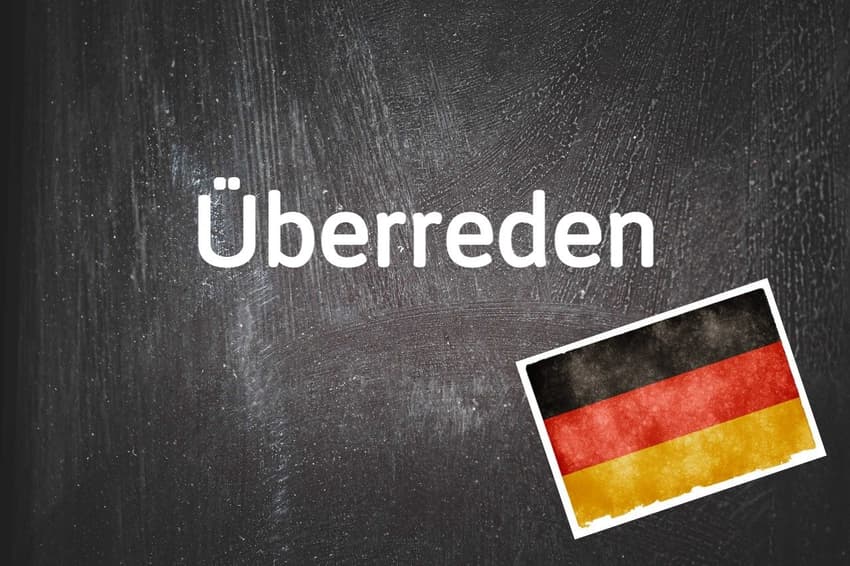German word of the day: Überreden

Whether it's a friend twisting your arm to get a beer on a work night or your other half convincing you to finally try bungee-jumping, this nifty German word could come in handy for certain high-pressure situations.
Why do I need to know überreden?
Because überreden can perfectly describe a nuanced - and all-too-common - social situation, and it's also a prime example of how many German verbs are built.
What does it mean?
Looking at the two components of the word, überreden (pronounced like this) quite literally means to "talk over" someone. But unlike in English, this doesn't refer to speaking in a louder voice while your friend or partner is trying to have their say.
Instead, it refers to situations where you might pressure a friend to do something and, eventually, they agree to do it - but their heart isn't necessarily in it.
In this way, it's comparable to English phrases like "talking someone round" or "twisting someone's arm". Through the sheer force of your arguments (or sheer persistence) you've managed to get them on side, but internally they're still not necessarily convinced. In fact, they've probably caved in to appease you.
READ ALSO: German word of the day: Umstritten
Alternatively, if you have indeed been able to convince someone deep down, the word you're looking for is überzeugen. This handy verb describes that magical moment when you've managed to talk someone round to your point of view, and they're convinced both inside and out.
Anything else I need to know?
If you're stuck on a German verb, a good way to approach it is to divide it into little building blocks, and überreden is no exception. In this case "über" (over) heightens the ordinary "reden" (to talk) to pit you above whoever you're talking to (and trying to talk round). And with the root "reden", you have many other options than simply "über".
The suffix "zu" (to) turns "reden" into a motivational pep-talk, while a combination "aus" (out) and "reden" tells your listener that you've finished what you want to say.
Recognising what each of these prefixes stand for and looking for the root of a word is a great way to expand your vocabulary almost overnight.
Use it like this:
Kannst du bitte aufhören, mich überzeugen zu wollen? Es wird nicht funktionieren!
Can you please stop trying to persuade me? It's not going to work!
Ehrlich gesagt hatte ich was anderes vor, aber er hat mich überredet!
To be honest, I had other plans, but he twisted my arm!
Comments
See Also
Why do I need to know überreden?
Because überreden can perfectly describe a nuanced - and all-too-common - social situation, and it's also a prime example of how many German verbs are built.
What does it mean?
Looking at the two components of the word, überreden (pronounced like this) quite literally means to "talk over" someone. But unlike in English, this doesn't refer to speaking in a louder voice while your friend or partner is trying to have their say.
Instead, it refers to situations where you might pressure a friend to do something and, eventually, they agree to do it - but their heart isn't necessarily in it.
In this way, it's comparable to English phrases like "talking someone round" or "twisting someone's arm". Through the sheer force of your arguments (or sheer persistence) you've managed to get them on side, but internally they're still not necessarily convinced. In fact, they've probably caved in to appease you.
READ ALSO: German word of the day: Umstritten
Alternatively, if you have indeed been able to convince someone deep down, the word you're looking for is überzeugen. This handy verb describes that magical moment when you've managed to talk someone round to your point of view, and they're convinced both inside and out.
Anything else I need to know?
If you're stuck on a German verb, a good way to approach it is to divide it into little building blocks, and überreden is no exception. In this case "über" (over) heightens the ordinary "reden" (to talk) to pit you above whoever you're talking to (and trying to talk round). And with the root "reden", you have many other options than simply "über".
The suffix "zu" (to) turns "reden" into a motivational pep-talk, while a combination "aus" (out) and "reden" tells your listener that you've finished what you want to say.
Recognising what each of these prefixes stand for and looking for the root of a word is a great way to expand your vocabulary almost overnight.
Use it like this:
Kannst du bitte aufhören, mich überzeugen zu wollen? Es wird nicht funktionieren!
Can you please stop trying to persuade me? It's not going to work!
Ehrlich gesagt hatte ich was anderes vor, aber er hat mich überredet!
To be honest, I had other plans, but he twisted my arm!
Join the conversation in our comments section below. Share your own views and experience and if you have a question or suggestion for our journalists then email us at [email protected].
Please keep comments civil, constructive and on topic – and make sure to read our terms of use before getting involved.
Please log in here to leave a comment.